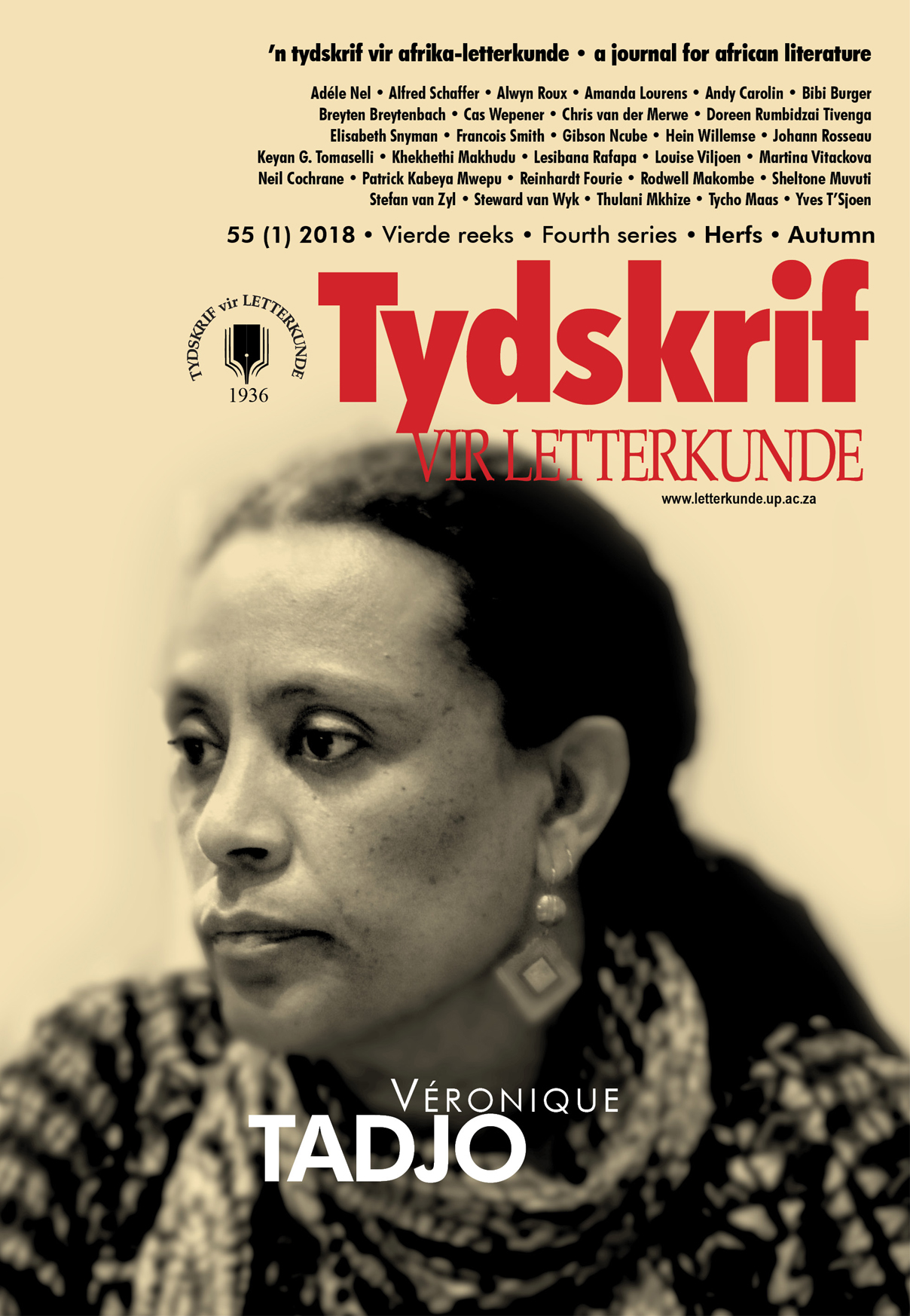Véronique Tadjo: Is there hope beyond the divisions in contemporary Africa?
DOI:
https://doi.org/10.17159/2309-9070/tvl.v.55i1.1646Keywords:
Véronique Tadjo, Francophone women's writing, Social divisions within a nationAbstract
This article proposes a reading of three texts The Blind Kingdom (1990), Queen Pokou. Concerto for a sacrifice (2004) and Far from my Father (2010) written by the Ivorian author Véronique Tadjo, in order to examine the author's representation of, and reflexion on separation and division, be it within a nation, amongst groups, or in the heart of a family. In Tadjo's novelistic universe, such divisions often require the intervention of a female protagonist, whose own existence is deeply influenced by tensions and frictions between two opposing camps. I shall argue that the agency of these protagonists is never futile and may even point to a way to go beyond the original divisions. Tadjo's representation of division in these three texts goes beyond generic boundaries to open up a rich variety of perspectives on the problems she deals with. I shall demonstrate how the author draws on various genres such as poetry, the African folktale, the novel, as well as autofiction in order to engage the reader in a profound reflexion on the current state and future of the African continent.
Downloads
References
Bhabha, Homi K. Les lieux de la culture. Une théorie postcoloniale. Payot, 2007.
Cazenave, Odile. Femmes rebelles. Naissance d’un nouveau roman africain au féminin. Harmattan, 1996.
Farrar, Tahriku. “The Queenmother, Matriarchy and the Question of Female Political Authority in Precolonial West African Monarchy.” Journal of Black Studies, vol 27, no 5, 1997, pp. 579–97.
Genette, Gerard. Paratexts: Thresholds of Interpretation (Literature, Culture and Theory). CUP, 1997.
Kingué, Adèle & Odille Cazenave. “Pour l’enseignement des écrivains femmes africaines dans le cours de français.” The French Review, vol 70, no 5, 1997, pp. 641–57.
Lacapra, Dominick. Writing History, Writing Trauma. The John Hopkins University Press, 2001.
Ligaga, Dina. “Re-imagining and re-writing the legend of Queen Pokou.” African Identities, vol 9, no 4, 2011, pp. 487–91, http://dx.doi.org/10.1080/14725843.2011.615163.
Mbelle, Joseph. “Women in the African Epic.” Research in African Literatures, vol 37, no 2, 2006, pp. 61–7.
Tadjo, Véronique. “A Conversation with Janis Mayes.” African Writing Online, vol 4, no. 2, Dec. 2016, http://www.african-writing.com/four/veroniquetadjointerview.htm.
Tadjo, Véronique. Le Royaume aveugle. Harmattan, 1990.
Tadjo, Véronique. “Lifting the cloak of invisibility. A writer’s perspective,” Research in African Literatures, vol 44, no 2, 2013, pp. 1-7.
Tadjo, Véronique. Loin de mon père. Actes Sud, 2010.
Tadjo, Véronique. “Of saviours, gods and domination: The rise and fall of Laurent Gbagbo.” James S. Coleman Memorial Lecture Series. James S. Coleman African Studies Centre UCLA. U of California. Lecture. 18 Mar 2011.
Tadjo, Véronique. Reine Pokou. Concerto pour un sacrifice. Edicef, 2011.
Toivanen, Anna-Leena. “Daddy’s Girls?: Farther-Daughter Relations and the Failures of the Postcolonial Nation-State in Chimanda Ngozi Adichie’s Purple Hibiscus and Véronique Tadjo’s Loin de mon père”. Ariel: A Review of International English Literature, vol 44, no 1, 2013, pp. 99–126.
Vassilatos, Alexia. “Au croisement des cultures. Reine Pokou de Véronique Tadjo au niveau des études supérieures dans le contexte sud-africain”. French Studies in Southern Africa, vol 40, 2016, pp. 132–48.
Downloads
Published
Issue
Section
License
Copyright (c) 2018 Tydskrif vir Letterkunde

This work is licensed under a Creative Commons Attribution-ShareAlike 4.0 International License.


 https://orcid.org/0000-0001-6465-6584
https://orcid.org/0000-0001-6465-6584


.png)